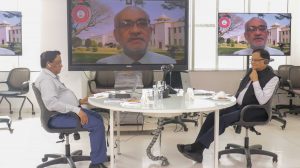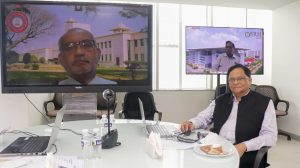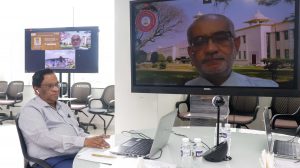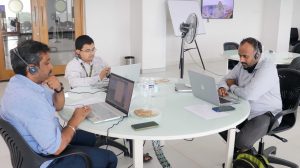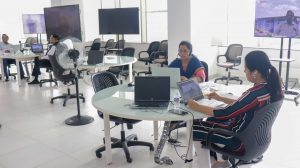Prof Lakshmi Kantam to present a captivating speech on Catalysts for Sustainable Chemical Industry
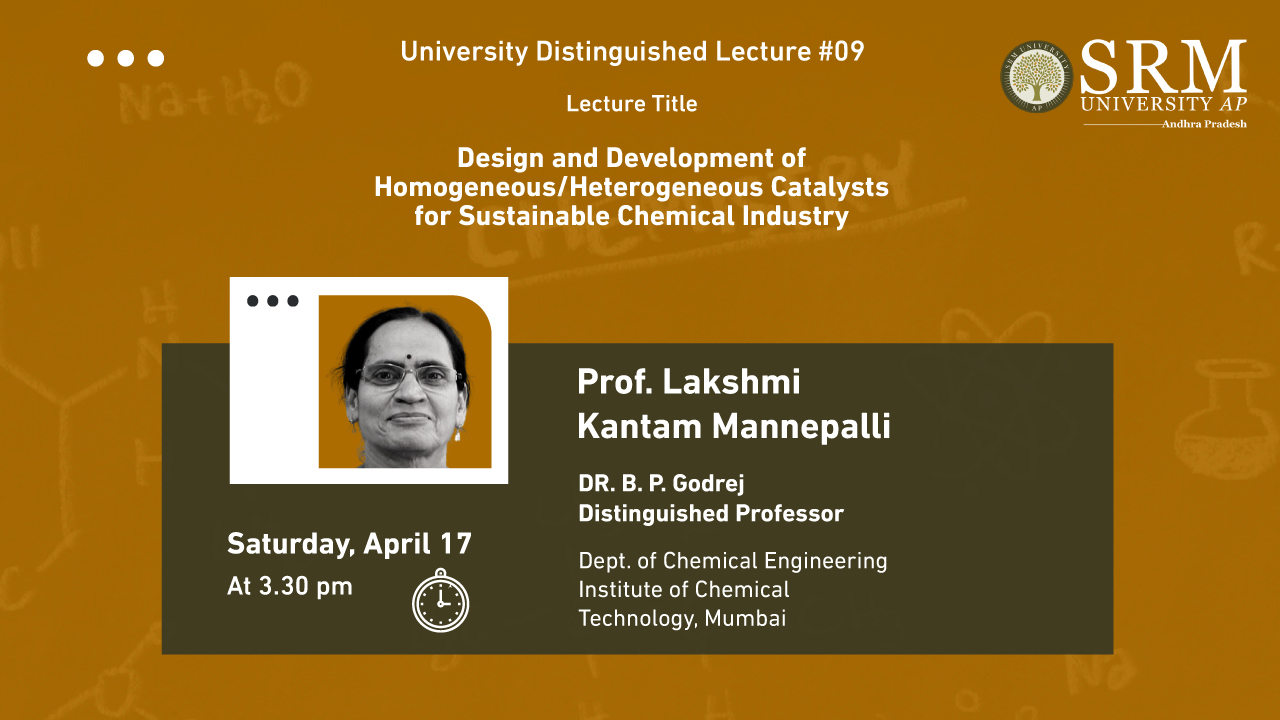 SRM University-AP, Andhra Pradesh, invites Prof M Lakshmi Kantam in the ninth edition of the University Distinguished Lecture Series to deliver the keynote address on “Design and Development of Homogeneous/Heterogeneous Catalysts for Sustainable Chemical Industry” on Saturday, April 17, 2021, at 03.30 PM. Our guest of the evening, Prof M Lakshmi Kantam, FNA, FTWAS, FNASc, FRSC, is a renowned name in the field of Chemical Sciences and Engineering. She is presently the Dr B P Godrej Distinguished Professor of Green Chemistry and Sustainability Engineering at the Department of Chemical Engineering, Institute of Chemical Technology, Mumbai.
SRM University-AP, Andhra Pradesh, invites Prof M Lakshmi Kantam in the ninth edition of the University Distinguished Lecture Series to deliver the keynote address on “Design and Development of Homogeneous/Heterogeneous Catalysts for Sustainable Chemical Industry” on Saturday, April 17, 2021, at 03.30 PM. Our guest of the evening, Prof M Lakshmi Kantam, FNA, FTWAS, FNASc, FRSC, is a renowned name in the field of Chemical Sciences and Engineering. She is presently the Dr B P Godrej Distinguished Professor of Green Chemistry and Sustainability Engineering at the Department of Chemical Engineering, Institute of Chemical Technology, Mumbai.
Her areas of expertise are Catalysis, Materials & Process Chemistry.
Prof Lakshmi Kantam did her Bachelor in Science from Andhra Pradesh. The Alumna of Kurukshetra University pursued her masters and doctoral studies there. She has further received Honorary Doctorate in Science by Sri Padamavati Mahila Viswavidayalam, Tirupathi, in 2014.
She was the former Director of CSIR-Indian Institute of Chemical Technology, Hyderabad. She is also an Honorary Professor at The University of New Castle, Australia and an Adjunct Professor at RMIT University, Melbourne, Australia. Apart from managing various academic and leadership positions for various organisations, Prof Kantam is also the Non-Executive Independent Director at Godavari Biorefineries Ltd, Indo-Amines Ltd., and Vinati Organics Ltd.
Prof Lakshmi Kantam is one of India’s leading researchers in the domain of Chemical Engineering and is bestowed with numerous awards and recognition for her commendable contributions to the scientific fraternity. The admirable scientist has published 347 research papers in reputed peer-reviewed journals with citations of 16018. she has further authored and edited five books. The brilliant scientific mind has been granted 52 patents for her innovations. Her present Industry Collaborations include companies such as GBL, VOL, Hikal Ltd, Indo Amines Ltd, Jubilant, Rallies, Kesar Petroproducts Ltd, GACL, Marvel Drugs, Prasol, Mangalam Organics etc.
She is associated with various Government Organisations, including the Department of Atomic Energy, Department of Science and Technology, High Energy Materials Research Laboratory-Pune (DRDO), IIT-Hyderabad, GAIL, etc., to name a few.
Prof Kantam’s contributions are recognised with numerous honours and awards. She has been awarded ICC -D.M.Trivedi Lifetime Achievement Award in 2019, Devang Mehta – National Education Award (Women in Education Award) in 2017, Asian Paints Padma Vibhushan Dr R A Mashelkar Medal and Chemcon Distinguished Speaker Award (For leadership in Science, Technology and Education)-CHEMCON in 2016, J.C.Bose Fellowship (SERB-DST) in 2015, Lifetime Achievement Award by Indian Chemical Society in 2011.
She is further honoured as a Fellow of The World Academy of Sciences (TWAS), Indian National Science Academy, The Royal Society of Chemistry- UK, National Academy of Sciences, India.
The spirited woman also performs her scholarly duties as the Editorial Board Member at Chemical Record (TCR), Wiley-VCH and Journal of Chemical Sciences, Springer Publishers and the Associate Editor, Catalysis in Green Chemistry and Engineering, Begell house.
Join the webinar on April 17 at 3.30 PM to listen to the captivating speech of the leading scientist in Chemical Engineering and avail this opportunity to broaden your perspectives.
Register: https://srmap.zoom.us/webinar/register/WN_49e3PfuOTg6-q8tBZZ72yQ (Registration Closed)
- Published in Events, Research Events, Research Webinars, University Distinguished Lecture, Webinars
“Chemists have to play a major role to achieve sustainable development”- opined Prof Lakshmi Kantam in the University Distinguished Lecture Series
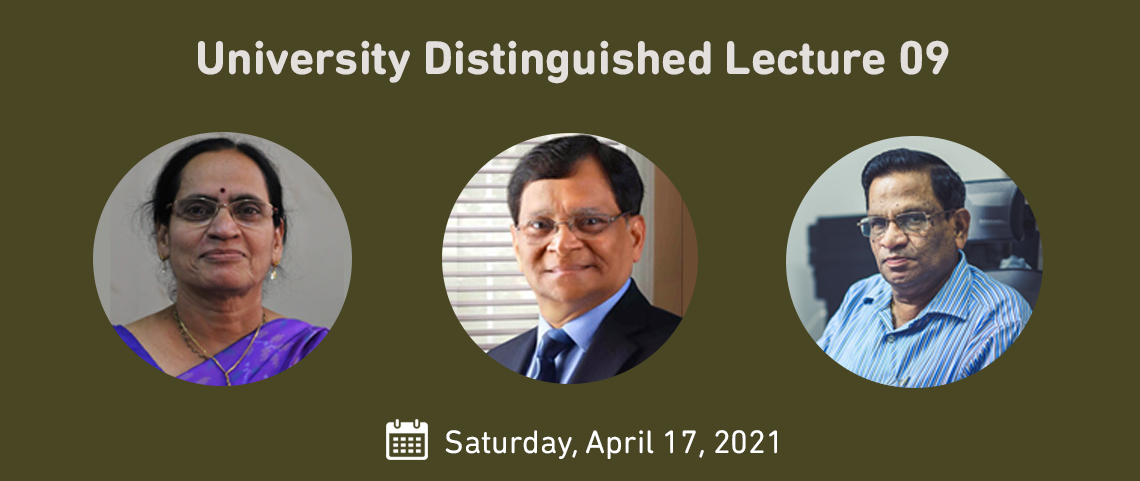 Observing the ninth edition of University Distinguished Lecture Series, SRM University, Andhra Pradesh, invited Prof Lakshmi Kantam Mannepalli, the Dr B P Godrej Distinguished Professor of Green Chemistry, Department of Chemical Engineering, Institute of Chemical Technology, Mumbai, to address a captivating speech on “Design and Development of Homogeneous/Heterogeneous Catalysts for Sustainable Chemical Industry”. Prof D Narayana Rao, Pro Vice-chancellor, inaugurated the talk with a welcome speech. The ceremony was attended by Prof VS Rao, Vice-Chancellor SRMAP and Dr S Mannathan, Department of Chemistry. Prof D Narayana Rao expressed that “Industrial collaboration is very much necessary in the context of self-reliant India (Atma Nirbhar Bharat)”.
Observing the ninth edition of University Distinguished Lecture Series, SRM University, Andhra Pradesh, invited Prof Lakshmi Kantam Mannepalli, the Dr B P Godrej Distinguished Professor of Green Chemistry, Department of Chemical Engineering, Institute of Chemical Technology, Mumbai, to address a captivating speech on “Design and Development of Homogeneous/Heterogeneous Catalysts for Sustainable Chemical Industry”. Prof D Narayana Rao, Pro Vice-chancellor, inaugurated the talk with a welcome speech. The ceremony was attended by Prof VS Rao, Vice-Chancellor SRMAP and Dr S Mannathan, Department of Chemistry. Prof D Narayana Rao expressed that “Industrial collaboration is very much necessary in the context of self-reliant India (Atma Nirbhar Bharat)”.
Advancing with Prof Lakshmi Kanam’s presentation, she added, “Global and Indian chemical industry estimate 5.1 trillion and 108.4 billion USD in 2021. Catalysis is a highly demanded technology for a sustainable society and drives innovation in many other fields. Achieving the high catalytic selectivity is the aim of catalysis science in 21 st century”.
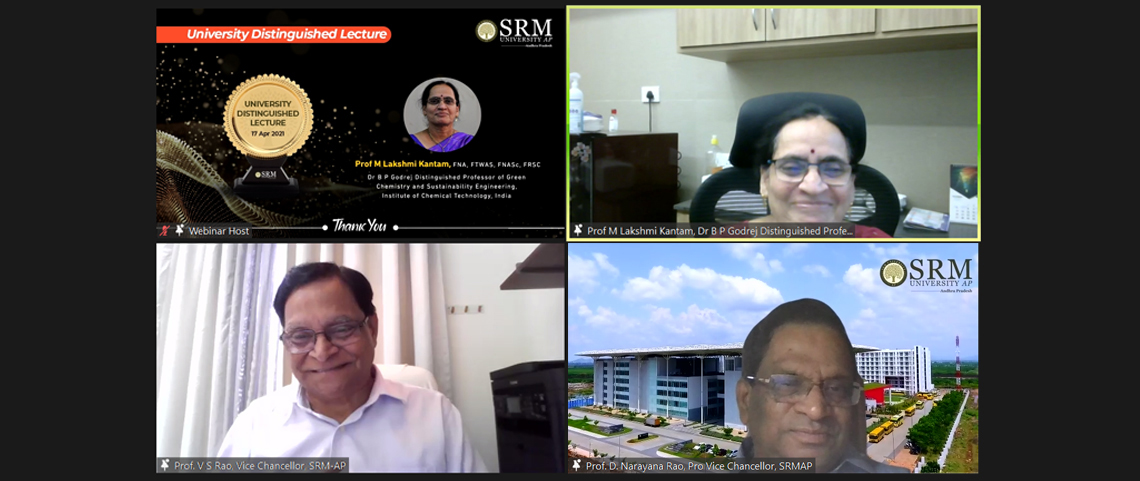 She also stated in her presentation, “The catalysis of organic reactions by homogeneous and heterogeneous catalysts remains a diversified field of scientific inquiry. It attracts a large group of scientists with specialities spanning synthetic organic chemistry, inorganic chemistry, surface science, material science, reaction engineering and computational modelling”.
She also stated in her presentation, “The catalysis of organic reactions by homogeneous and heterogeneous catalysts remains a diversified field of scientific inquiry. It attracts a large group of scientists with specialities spanning synthetic organic chemistry, inorganic chemistry, surface science, material science, reaction engineering and computational modelling”.
As a part of Prof Lakshmi Kantam’ s research study, she briefly explained, “Hydroxyapatite (HA) is a hydrated calcium phosphate material, which is an important biomaterial because of its similarity to the mineral component of mammalian bone. We have utilised these materials, and their metal exchanged materials as catalysts for C-C and C-N coupling reactions. Similarly, hydrotalcite, anionic clays have been exchanged with different metal ions and successfully applied in a number of organic transformations”. An overview of the work on the design and development of catalysts for sustainable, economical process and technologies for the chemical industry was introduced.
Noted personality in the field of Chemical Sciences and Engineering, Prof Lakshmi Kantam holds esteemed titles of FNA, FTWAS, FNASc, FRSC. Her fields of expertise are Catalysis, Materials and Process Chemistry. Prof Lakshmi Kantam served as the Director of CSIR-Indian Institute of Chemical Technology, Hyderabad. Prof. Lakshmi Kantam is Non-Executive Independent Director of Godavari Bio Refineries Ltd, Indo Amines Ltd, Vinati Organics Ltd and several others.
- Published in News, Research Events, Research News, Research Webinars, University Distinguished Lecture, Webinars
A pertinent discussion on “Higher Education in India in the Post-COVID-19” with Prof Anil Sahasrabudhe
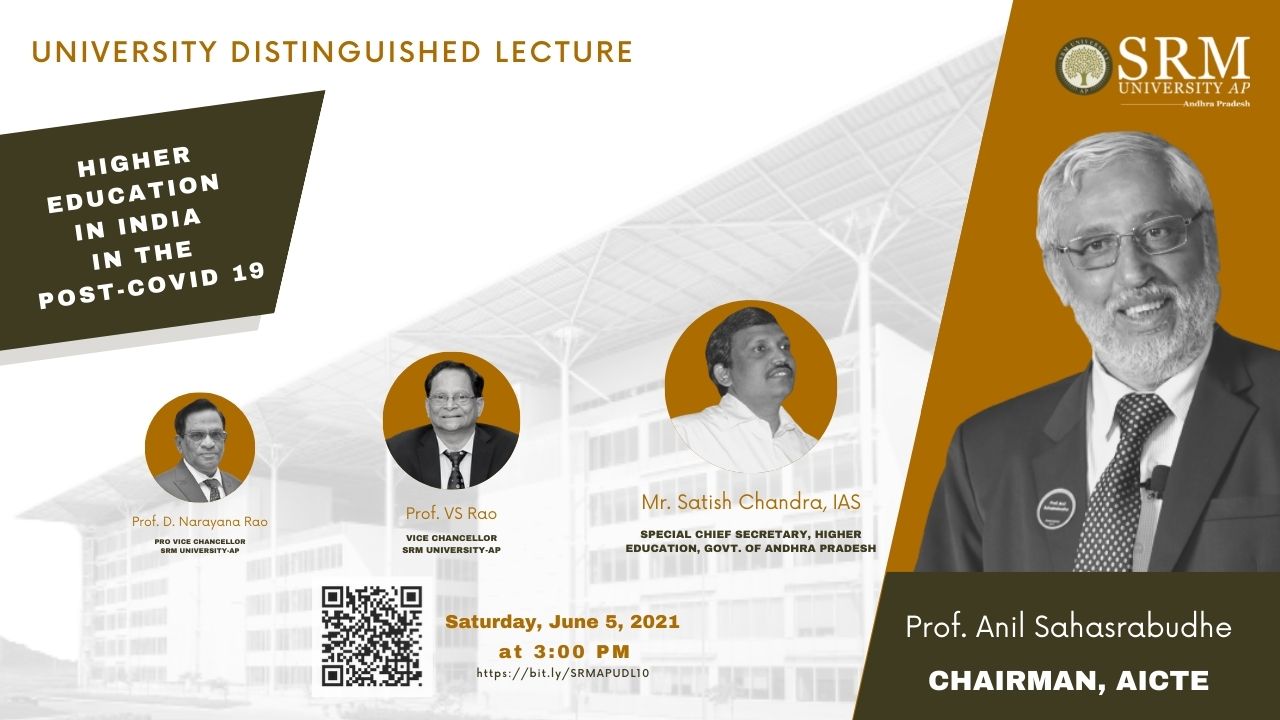 SRM University-AP presents the tenth edition of the University Distinguished Lecture Series with a relevant discussion on “Higher Education in India in the Post-COVID-19”. The webinar has been scheduled for Saturday, June 05, 2021, at 3 pm. Prof Anil Sahasrabudhe, Chairman of All India Council for Technical Education (AICTE), will join the webinar as the chief guest. Shri Satish Chandra, IAS, Special Chief Secretary, Higher Education, Government of Andhra Pradesh will give a special address.
SRM University-AP presents the tenth edition of the University Distinguished Lecture Series with a relevant discussion on “Higher Education in India in the Post-COVID-19”. The webinar has been scheduled for Saturday, June 05, 2021, at 3 pm. Prof Anil Sahasrabudhe, Chairman of All India Council for Technical Education (AICTE), will join the webinar as the chief guest. Shri Satish Chandra, IAS, Special Chief Secretary, Higher Education, Government of Andhra Pradesh will give a special address.
Prof Anil Dattatraya Sahasrabudhe is currently Chairman of the All India Council for Technical Education (AICTE). He was previously a Professor of Mechanical Engineering at Indian Institute of Technology (IIT)-Guwahati for 11 years.
Prof Anil D Sahasrabudhe has held several important Academic, Research and Administrative positions at the Indian Institute of Science, Bangalore, Tata Consulting Engineers, North Eastern Regional Institute of Science and Technology (NERIST), Itanagar (Arunachal Pradesh) and IIT Guwahati. He also served as Director, College of Engineering, Pune (CoEP) since 2006 on deputation from IIT, Guwahati, prior to joining as AICTE Chairman.
He is also the Chairman, Basic Scientific Research (BSR), Empowered Committee of UGC & SWAYAM Board. He is a Fellow of ISTE, IET, Institution of Engineers (IE), INAE.
As an academician and researcher in NERIST and IIT Guwahati, and an administrator at CoEP, he took up several initiatives for Academic, Curricular & Co-curricular activities, Entrepreneurship, Research and Good Governance.
Prof Anil Sahasrabudhe has been bestowed with several awards, which include “Maha-Intrapreneur Award-2011” of Praj Industries, Jeevan Gaurav Puraskar (Life Time Achievement Award) from MIT World Peace University, Pune in 2019, Mahatma Gandhi Leadership award from Indian Achievers Forum and CSR Times (2019).
Join the captivating webinar on June 5, 2021, at 3 pm to be a part of an exciting discussion on the Changing scenario of Higher Education in the Post-COVID era.
Register: http://bit.ly/SRMAPUDL10 (Registration Closed)
Programme Schedule: Know the detailed schedule here
- Published in Events, Research Events, University Distinguished Lecture, Webinars
Chairman-AICTE elucidated the changing scenarios of the education sector in the Post COVID era
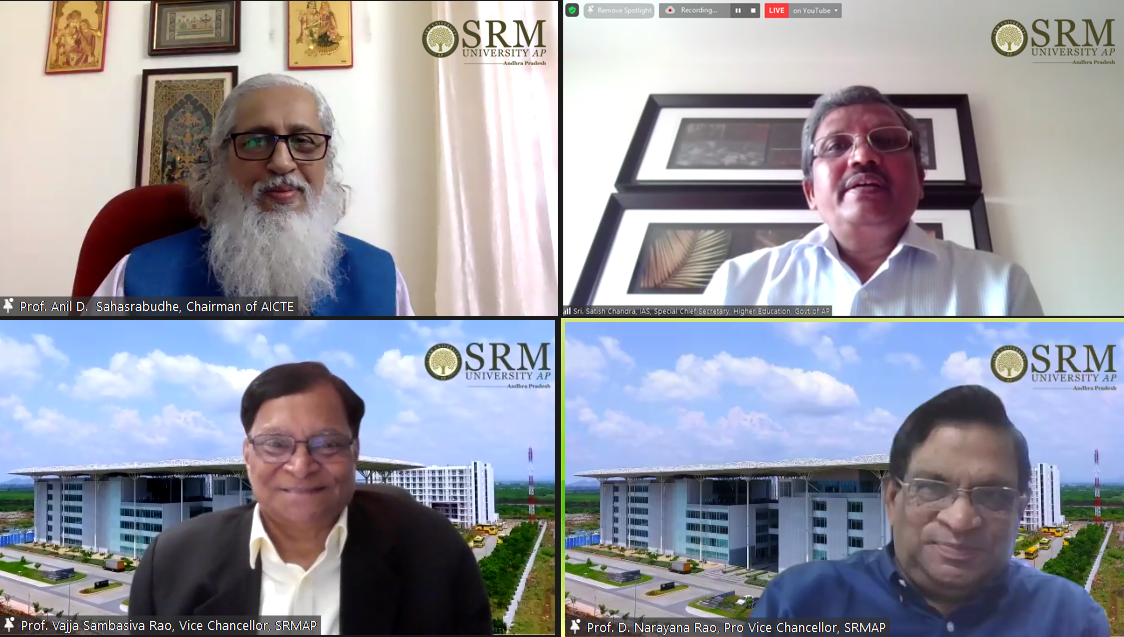
The Tenth edition of the University Distinguished Lecture (UDL) Series, organised by SRM University-AP, expounded on a pertinent problem of the current time, “Higher Education in India in the Post-COVID-19”. Prof Anil Sahasrabudhe, Chairman of All India Council for Technical Education (AICTE), delivered the Distinguished Lecture, and Shri Satish Chandra, IAS, Special Chief Secretary, Higher Education, Government of Andhra Pradesh, gave a special address.
In his welcome address, Prof D Narayana Rao, Pro-Vice-Chancellor of SRM University-AP, set the context of the event, emphasising on how the unprecedented COVID-19 crisis has resulted in the temporary closure of about 1000 Universities and about 40,000 Colleges in the country, severely disrupting the teaching and learning process and research activities. The transition to “Learn From Anywhere (LFA) happened overnight and people had to get used to it. National Education Policy (NEP) 2020 recognises the importance of leveraging the advantages of technology while acknowledging its potential risks and dangers. Online education calls for carefully designing and appropriately scaled studies to determine how the benefits of online/digital education can be reaped while addressing or mitigating the downsides. There is a need to establish a “Digital and online Wing” in the Departments of Education in different states of the country.
Prof Anil Sahasrabudhe in his Distinguished Lecture, delineated that the use of technology in the education environment has been initiated in the Pre-COVID days. Platforms such as Swayam, National Programme on Technology Enhanced Learning (NPTEL) came into existence to digitally bring quality education to everyone. Digital education carries a boon that no one can ignore, i.e. making physical distance irrelevant in education. Digital education has the ability to reach students anywhere and everywhere provided they are equipped with gadgets and internet connectivity. Thus, the Government of India has undertaken a nationwide project under, Bharat Net, Unnat Bharat Abhiyan to connect every corner of India through the internet. Prof Sahasrabudhe accepted that all subjects cannot be taught online, especially lab-based practical courses that will have the need to attend physical classes. Music, Drama, sports, other performing and fine arts, which are an essential part of a pedagogical system, cannot be studied online. Moreover, a digital class can never replace the bonding humans tend to develop while working in close proximity. However, it cannot be debated that the education system as we know it has changed. The future of education comes with a blended environment. Fortunately, National Education Policy-2020 envisioned the change long ago and introduced a relevant policy to ensure the educational growth of the country. Multidisciplinary Education and Research Universities (MERU), Academic Bank of Credits, National Academic Depository are some of the revolutionary changes that are going to benefit the next generations in the post COVID days. The government has already established National Research Foundations to support mega research projects, which may need several crores of rupees. Prof Anil Sahasrabudhe emphasised that studying in one’s native language is an essential requirement that NEP looks into. Prof Sahasrabudhe asserted that proper administration, governance and autonomy are some of the deciding factors for the education sector in the coming days. While concluding his speech, he further elucidated AICTE’s initiatives towards the advancement of the education sector-Curriculum Revisions, Project-Based Experiential Learning, Faculty Training, Industry Internships, Students Internship Programmes are soon to be inseparable aspects of the changing education sector.
Shri Satish Chandra highlighted the challenges associated with online education in respect to the state of Andhra Pradesh. 3000 colleges and 17 universities with 12 lakhs students in Higher Education Sector have got affected because of the pandemic. However, the future of education brings a blended environment with both online and offline teaching-learning options. He opined that LMS, Online Platforms, gadgets such as desktops, laptops or tablets are going to be a part of the new normal of the education sector. The Government of Andhra Pradesh strives to help economically backward students by providing the gadgets at an affordable cost under various scholarship schemes.
- Published in Events, News, Research Events, University Distinguished Lecture
Dr K Kasturirangan expounds the nuances of NEP-2020
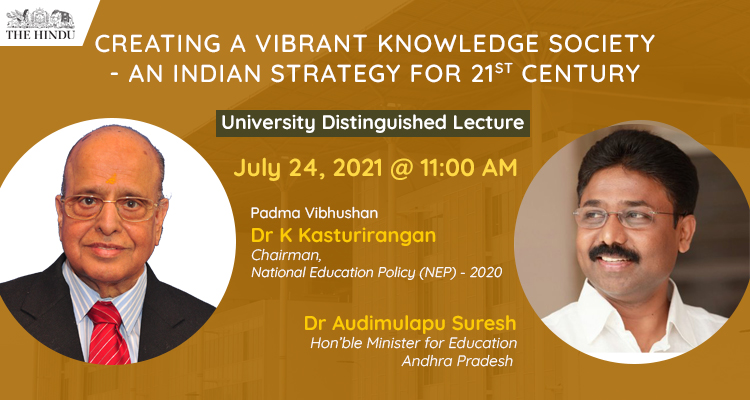 The eleventh edition of the University Distinguished Lecture Series in SRM University-AP, Andhra Pradesh, is scheduled to be held on July 24, 2021, Saturday, at 11.00 am. Padma Vibhushan awardee Dr K Kasturirangan, Chairman, National Education Policy-2020 (NEP), will deliver the virtual lecture as the chief guest. Dr Audimulapu Suresh, minister of education in the government of Andhra Pradesh, will also join the esteemed lecture.
The eleventh edition of the University Distinguished Lecture Series in SRM University-AP, Andhra Pradesh, is scheduled to be held on July 24, 2021, Saturday, at 11.00 am. Padma Vibhushan awardee Dr K Kasturirangan, Chairman, National Education Policy-2020 (NEP), will deliver the virtual lecture as the chief guest. Dr Audimulapu Suresh, minister of education in the government of Andhra Pradesh, will also join the esteemed lecture.
In the lecture titled “Creating a Vibrant Knowledge Society – An Indian Strategy for 21st Century”, Dr Kasturirangan will explicate the nuances underlying the conceptualisation of National Education Policy 2020. Being the first education policy of the 21st century, NEP 2020 proposes to address the many growing developmental imperatives of our country. This policy aims to revise and revamp all aspects of the education structure, including its regulation and governance, and create a new system that is aligned with the aspirational goals of 21st-century education while building upon India’s traditions and value systems.
More about the Distinguished Guest:
Dr K. Kasturirangan is currently Chancellor, Central University of Rajasthan; Chairman, Governing Board, Inter-University Centre for Astronomy and Astrophysics (IUCAA); Chairperson, NIIT University, Neemrana; Member, Atomic Energy Commission, Emeritus Professor at National Institute of Advanced Studies (NIAS), Bangalore and Honorary Distinguished Advisor, Indian Space Research Organisation (ISRO). He has been conferred with the highest civilian honours Padma Shri (1982), Padma Bhushan (1992) and Padma Vibhushan (2000) by the President of India, the Rajyotsava Prashasthi (2014) from Government of Karnataka and Award of ‘Officer of the Legion d’honneur’ (2002) by the President of the French Republic, France.
Every month, the University Distinguished Lecture (UDL) hosted by SRM University-AP is being attended by about 2000 members from IITs, NITs, IISERs, Universities/institutions, CSIR, DST, DBT, DRDO, DAE, ISRO, NARL, MoES and several others from different parts of the country. We gladly invite you to attend the enlightening UDL-11 session with the doyen of the Indian education system, Dr K Kasturirangan.
Register here: https://srmap.zoom.us/webinar/register/WN_49Zwu_m8Srep-qrnNWMW0Q (Registration Closed)
- Published in Events, Research Events, University Distinguished Lecture
Algorithms as the game-changer in the digital era
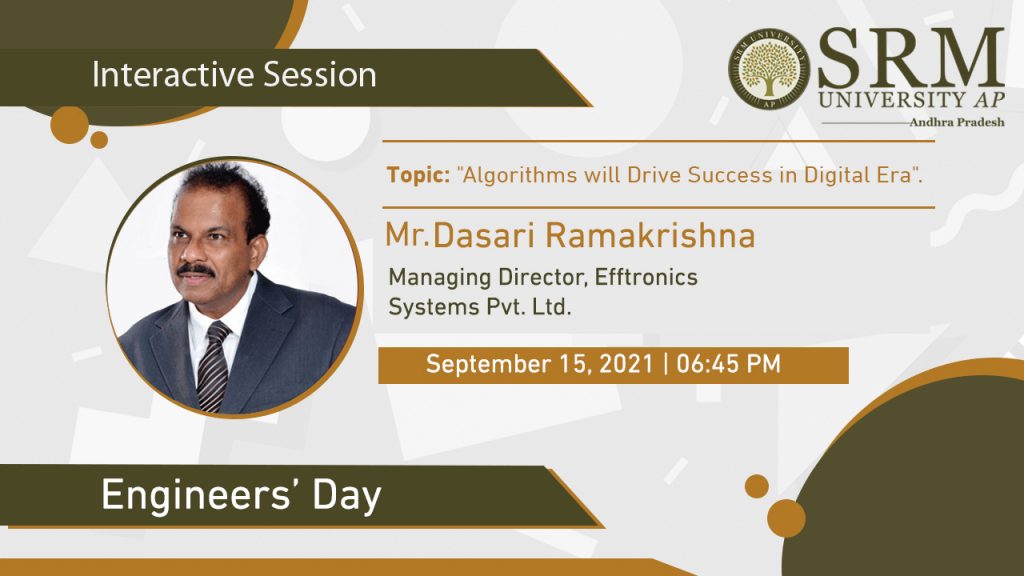 Industrie 4.0 has become increasingly global and cross-industry, driving digital transformation across industries, businesses, and governments. SRM University-AP observes National Engineers’ day with an inspiring talk by Mr Dasari Ramakrishna, Managing Director, Efftronics Systems Pvt. Ltd., on September 15, 2021, at 06.45 pm.
Industrie 4.0 has become increasingly global and cross-industry, driving digital transformation across industries, businesses, and governments. SRM University-AP observes National Engineers’ day with an inspiring talk by Mr Dasari Ramakrishna, Managing Director, Efftronics Systems Pvt. Ltd., on September 15, 2021, at 06.45 pm.
The heartbeat of the Fourth Industrial Revolution is algorithms. While algorithms are not new, the transition of businesses to be algorithmic is game-changing. Mathematicians describe an algorithm as an encapsulated set of rules that act on data to determine an outcome. In today’s digitalized world, companies use algorithms on a daily basis to influence and support decisions (fact-based decision making). In system development, algorithms building is the most challenging and major activity. Often engineers are expected to build completely new algorithms which are not available in the market (internet). One should adopt commonly available algorithms when required. But what is more important is to use various algorithmic concepts/principles together in combination to build a new algorithm. Like any development, algorithms building also follows the cycle of defining, analysing, designing, implementing, and testing iteratively in a systematic way. If one had to build algorithmic thinking, they need to practice with different scenarios, reflect upon the results and experiment continuously.
Every year on September 15, India commemorates Mokshagundam Visvesvaraya’s accomplishments by observing National Engineers Day. Visvesvaraya, the Bharat Ratna awardee, was born in the Karnataka village of Muddenahalli on September 15, 1861. As a pioneer in engineering, he made numerous contributions to the infrastructural backbone of the country.
About the Speaker:
Mr Dasari Ramakrishna is the founding CEO of Efftronics Systems Pvt. Ltd., established in 1985. Backed by rich R&D, Efftronics is now a leading provider of smart solutions for railway signalling, smart cities, smart buildings and industries. He is the architect of one of India’s largest IoT networks built for Indian railways with more than 6 million things connected across 9000 locations. He is a continuous learner & thought leader. Under his leadership, Efftronics has innovated more than 50 solutions for different domains. By continually growing Efftronics, Mr Ramakrishna has proved to the Indian industry that “With right aspirations and sincere effort to deliver value to customers, it is possible to be successful and location doesn’t matter.” He is the former chairman of CII- A.P State Council. He serves as a member of the board of studies, academic councils and governing body for several educational institutions and advisor for various universities.
Join this rekindling session on September 15, 2021, at 06.45 pm to understand the complexities of algorithm building.
- Published in Events, Research Events, Students Affairs Events
Photonic crystals-based DWDM devices for optical networking applications
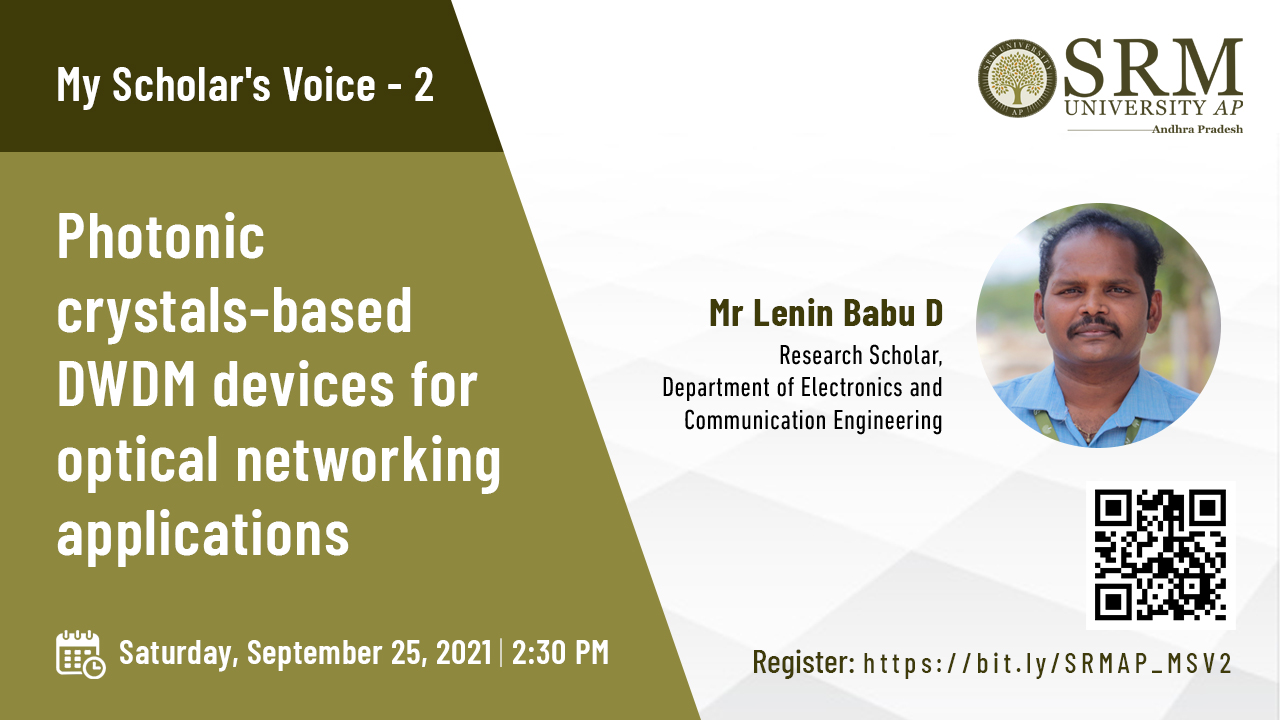 The research scholars from the Department of Electronics and Communication Engineering with great support and supervision from the faculty have planned to conduct their second Research Scholar’s Talk Series MSV-II on 25 September 2021 at 02:30 pm. Mr D Lenin Babu will engage the participants from 11:00 am to 12:00 pm with his enlightened talk on Photonic crystals-based DWDM devices for optical networking applications.
The research scholars from the Department of Electronics and Communication Engineering with great support and supervision from the faculty have planned to conduct their second Research Scholar’s Talk Series MSV-II on 25 September 2021 at 02:30 pm. Mr D Lenin Babu will engage the participants from 11:00 am to 12:00 pm with his enlightened talk on Photonic crystals-based DWDM devices for optical networking applications.
About the Speaker:
Mr D Lenin Babu is pursuing his PhD under the guidance of Dr Sreenivasulu (Department of ECE, SRM University-AP). He received his B Tech degree in ECE from JNTU Kakinada and received his MTech with specialization in Embedded systems from Vignan University in 2015. His research interests include integrated optical devices for optical communication systems. He is working towards his thesis titled “Photonic crystals based DWDM devices for optical networking applications”.
Join this engaging webinar on 25 September 2021, at 02.30 pm to learn more about photonic crystals-based DWDM devices for optical networking applications!
- Published in Departmental Events, ECE Events, Events, Research Events, Research Webinars
Integration of Science, Engineering and Technology is the key to sustainable development
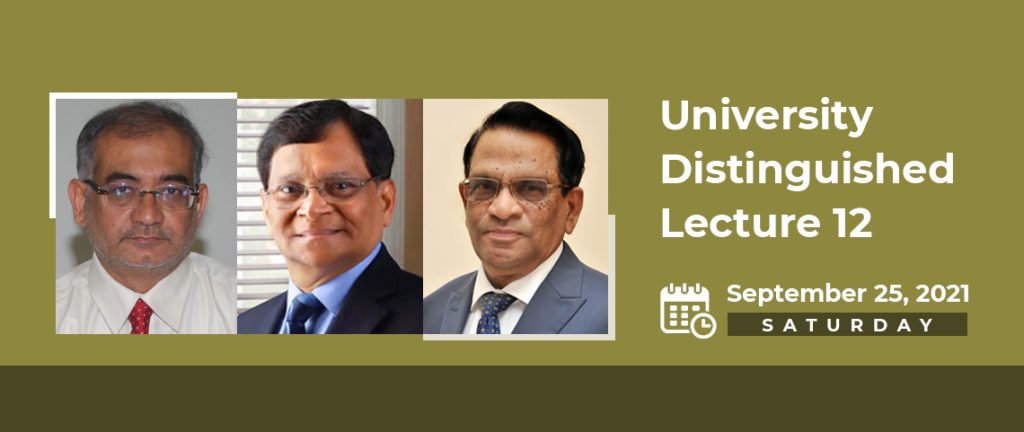 The 12th edition of the widely popular University Distinguished Lecture Series delved into the pertinent relationship between Science, Engineering and Technology. During the distinguished lecture, “Science-Engineering-Technology Synergy for Sustainable Growth”, Prof Indranil Manna well explained the correlation between the streams and how scientists, engineers and industry experts should work together for maximum societal benefits. Prof Indranil Manna, a JC Bose fellow of DST, is currently the Vice-Chancellor of BIT Mesra. The event took place on September 24, 2021, in virtual mode.
The 12th edition of the widely popular University Distinguished Lecture Series delved into the pertinent relationship between Science, Engineering and Technology. During the distinguished lecture, “Science-Engineering-Technology Synergy for Sustainable Growth”, Prof Indranil Manna well explained the correlation between the streams and how scientists, engineers and industry experts should work together for maximum societal benefits. Prof Indranil Manna, a JC Bose fellow of DST, is currently the Vice-Chancellor of BIT Mesra. The event took place on September 24, 2021, in virtual mode.
In his address, Prof Indranil Manna asserted that India is no longer a poor country but a mighty economic power with a 3 trillion dollar economy. “We are considered as one of the strongest nations of the world today, not because of the population or because of the youth living in the country, but we are the ones who could send mission to mars at the cheapest cost, and also successfully identified the existence of water on the surface of the moon. Further, we are one of the very few nuclear harnessing nations of the world,” said Prof Manna.
Science began its journey in order to find out the truths of nature. “Why?”- this question is the driving force behind Science. Though Science unravels nature and truth primarily through curiosity or need inspired acts, and the occasional outcome is significant earth-breaking discoveries, sometimes it needs technology to prove it. On the other hand, Engineering deals with “How?” and for Technology, the question is “What?”. Engineering produces certain products and devices by specific designs and inventions. However, what is absolutely essential for the society is Technology, knowledge through the path of knowing ‘why’ and ‘how’ to know ‘what’ sells. Thus, Prof Manna prescribes SET, a conjugation of Science+Engineering+Technology, as the way forward for maximum societal benefits.
Prof Manna explained that innovation means new ideas, creative thoughts, new imaginations in the form of a device or method. It is incremental, cross-disciplinary, directed and translational. Innovation matures itself via Engineering or Technological interventions. Further, sustainability is a composite concept that means the ability to maintain the desired rate or level, avoiding depletion of resources, energy or disturbing the related ecosystem.
Engineering and Technology are the key factors to sustainability. Engineers are not technicians meant only for routine production, maintenance or testing. Instead, Engineering applies the principles of science and logic to develop viable solutions to societal aspirations and challenges. The core of engineering lies in the translation, fundamental concepts to design, develop, fabricate, exploit, analyse, model, stimulate and predict,” Prof Manna elaborated.
Government of India’s Technology Vision-2035 focuses on developing the quality of life of each Indian. Science is pursuing the truth relentlessly regardless of its necessity or immediate scope of application. It provides clues, if not answers and extends as far as imagination goes. Engineering is all about enabling and providing solutions borrowing from the fundamentals of science. Technology is the last mile for societal benefit, based on scientific discovery and engineering inventions and innovations.
India is a great innovator and showcasing continuous gradual progress in it. In the Global Innovation Index (GII), India ranks 48 (2020), making it into the top 50 for the first time. Prof Manna believes that India has enough talent and potential to make it into the top 10. “Let us ensure that Science-Engineering-Technology in India complement each other and flourish together so that our society soon achieves the desired culture, growth and prosperity,” Prof Manna Concluded.
In his welcome address, Prof D Narayana Rao, Pro-Vice-Chancellor, SRM University-AP, said that the development and use of Science & Technology are critical for the achievement and sustenance of various sectors. The importance of Science and Technology to modern society and the role of the technologically educated population in promoting social and environmental developments have long been recognised. Science and technology are considered the most effective means to enhance the growth and socio-economic developments of nations. Moreover, the universalism of science and the globalisation of technological production and trade offer unprecedented opportunities for focused cooperation for scientists, engineers and the institutions that employ them to further progress in sustainable development. Even, National Education Policy-2020 advocated multidisciplinary, multi-institutional research for sustainable development.
In his concluding remarks, Prof V S Rao, Vice-chancellor, SRM University-AP, congratulated Prof Indranil Manna on delivering such a motivating lecture. He further honoured him by presenting a memento.
- Published in News, Research Events, Research News, University Distinguished Lecture
Science, Technology, and Innovation Policy 2020
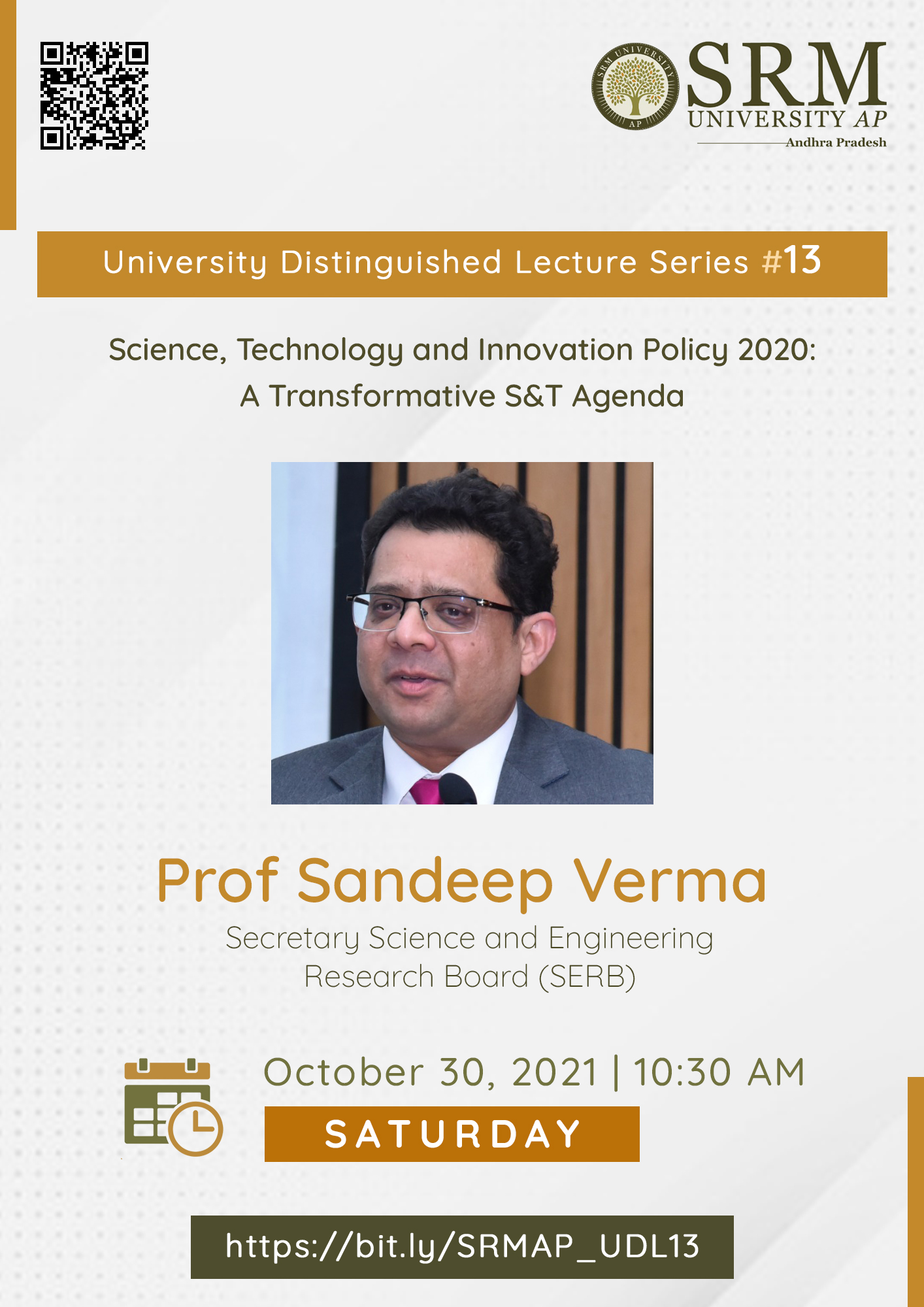 SRM University-AP is bringing forth the thirteenth edition of the University Distinguished Lecture on October 30, 2021, Saturday at 10.30 am. The globally established Dr Sandeep Verma, known for his contribution to the fields of bioorganic chemistry and chemical biology, will deliver a lecture on Science, Technology, and Innovation Policy 2020: A Transformative S&T Agenda.
SRM University-AP is bringing forth the thirteenth edition of the University Distinguished Lecture on October 30, 2021, Saturday at 10.30 am. The globally established Dr Sandeep Verma, known for his contribution to the fields of bioorganic chemistry and chemical biology, will deliver a lecture on Science, Technology, and Innovation Policy 2020: A Transformative S&T Agenda.
About the Speaker:
Dr Sandeep Verma is a member of the Science and Engineering Research Board (SERB), a statutory body established by the Parliament of India in 2008. He took charge as the secretary of SERB in 2019. SERB aims to accelerate research in Scientific and Engineering fields at a global scale by providing funds through calibrated funding for researcher mobility, awards, and honours to name a few.
Dr Sandeep Verma reserves the credit for the synthesis of enzyme mimics using metal-mediated systems. His group is engaged in developing bio-inspired soft matter and protocols for using biological building blocks as diagnostic tools for diseases.
Dr Verma received his master’s degree from Benaras Hindu University and then went for a PhD in the University of Illinois Medical Center, Chicago, USA. He went for two post-doctoral research, first at Johns Hopkins Hospital and the second at Max Planck Institute for Experimental Medicine, before returning to India to join the Indian Institute of Technology as an Assistant Professor. Dr Verma serves as an affiliated faculty in the Department of Biological Sciences and Bioengineering, Center for Nanoscience, and Center for Environmental Science and Engineering at IIT, Kanpur.
Additionally, Dr Verma is an elected fellow of the National Academy of Sciences, India, the Indian Academy of Sciences, the Indian National Science Academy (INSA), and a Senior Fellow of the Zukunftskolleg, University of Konstanz, Germany. The Chemical Research Society of India awarded him with a Silver Medal in 2017. He also received the National Prizes for Research on Interfaces between Chemistry and Biology (2017).
Along with it, Dr Verma is an Associate Editor for Chemical Communications (Royal Society of Chemistry, UK). He is also a member of the Editorial Advisory Boards of ChemBioChem, Cell Chemical Biology, and Journal of Peptide Science.
In 2010, Dr Sandeep Verma was awarded one of the highest Indian awards in the field of Science, the Shanti Swarup Bhatnagar Prize by The Council of Scientific and Industrial Research. Dr Verma won the Jawaharlal Nehru Memorial Fund Award, P. N. Bhargava Medal and BHU Vice Chancellor’s Gold Medal for academic excellence in master’s degree examination, and the J. Watumull Endowed Award of the University of Illinois at Chicago. He won the B. M. Birla Science Prize (2003), Swarnajayanti Fellowship (2005) in Chemical Sciences, and Bronze Medal (2005) of the Chemical Research Society of India.
It is an honour and an incomparable opportunity for all to have such a distinguished guest in our midst and to learn from him. The University Distinguished Lecture (UDL) hosted by SRM University-AP is attended by about 2000 members from IITs, NITs, IISERs, Universities/Institutions, CSIR, DST, DBT, DRDO, DAE, ISRO, NARL, MoES and several others from different parts of the country.
SRM University-AP cordially invites everyone to the thirteenth University distinguished Lecture that will promote transformative Scientific and Technological innovations on October 30, 2021, Saturday at 10.30 am.
Register to Join: https://bit.ly/SRMAP_UDL13 (Registration Closed)
- Published in Events, Research Events, University Distinguished Lecture
Dr Chennupati Jagadish on Semiconductor Nanostructures for Optoelectronics Applications
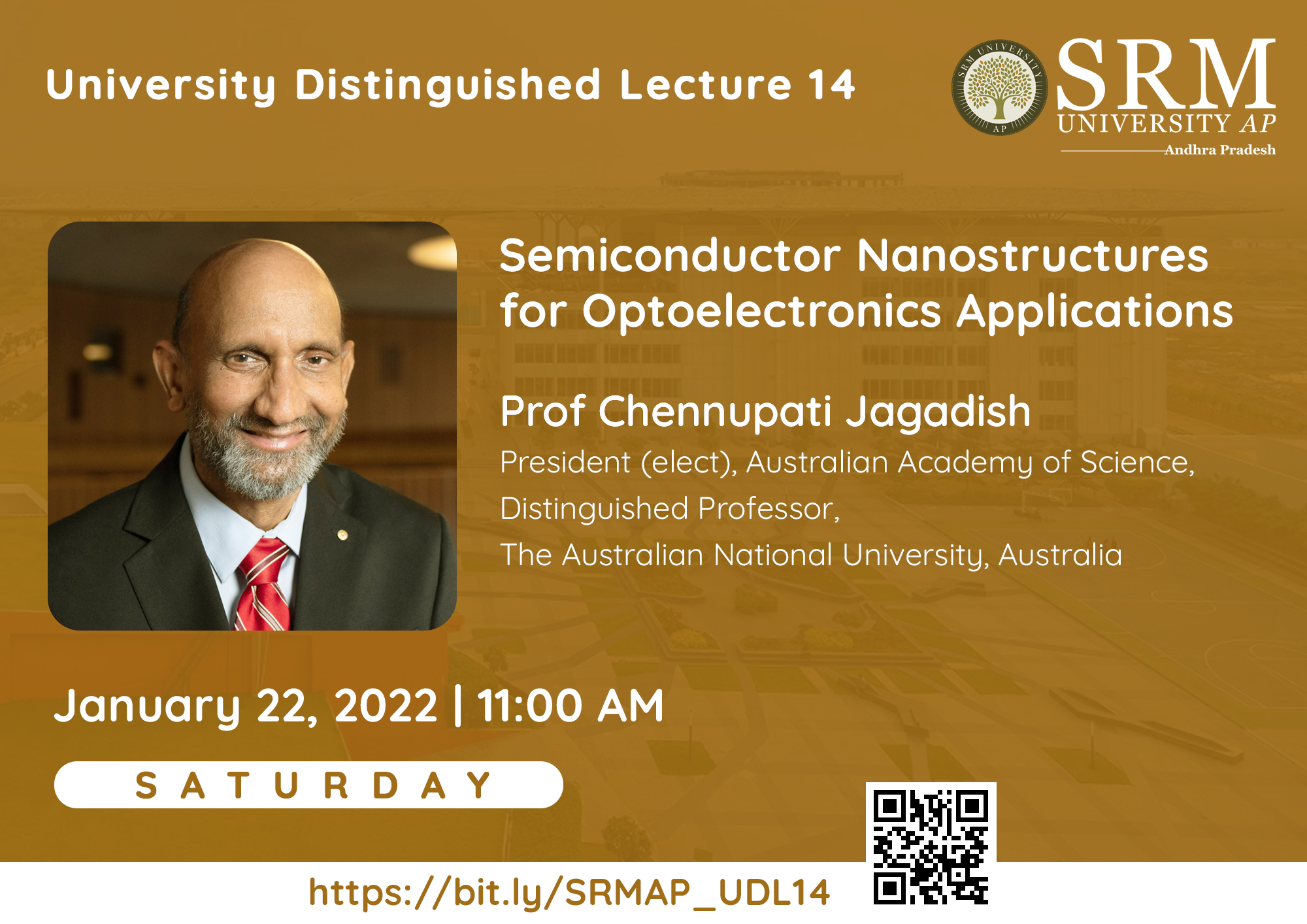 In the next installment of the University Distinguished Lecture, SRM University-AP brings to you Dr Chennupati Jagadish, a distinguished professor in Physics in the Research School of Physics and Engineering at the Australian National University. He leads the Semiconductor Optoelectronics and Nanotechnology Group as its head since its establishment in 1990 by him.
In the next installment of the University Distinguished Lecture, SRM University-AP brings to you Dr Chennupati Jagadish, a distinguished professor in Physics in the Research School of Physics and Engineering at the Australian National University. He leads the Semiconductor Optoelectronics and Nanotechnology Group as its head since its establishment in 1990 by him.
Date: January 22, 2022 (Saturday)
Time: 11.00 am IST
About the Topic:
Semiconductors have played an important role in the development of information and communications technology, solar cells, solid state lighting. Nanowires are considered as building blocks for the next generation electronics and optoelectronics. In this talk, I will present the results on optoelectronic devices such as lasers/LEDs, THz detectors, energy devices such as solar cells, photoelectrochemical (PEC) water splitting and Neuro-electrodes. Future prospects of the semiconductor nanowires will be discussed.
About the Speaker:
Dr Chennupati Jagadish obtained his Bachelor of Science degree in Physics from the Acharya Nagarjuna University in Tenali, Andhra Pradesh in the year 1977. He received his Master of Science in Applied Physics with a specialisation in Electronics from Andhra University in the year 1980. He acquired his PhD in Physics, by working on ‘Semiconducting Thin Films’, from the University of Delhi in the year 1986. He also held the position of a post-doctoral fellow in the Queens University.
Dr Jagadish moved to the Australian National University in the year 1990 and joined the newly established Department of Electronic Materials Engineering in the Research School of Physics and Engineering. He was the Vice-President and Secretary at the Australian Academy of Science for Physical Sciences for four years.
Committed to his role as an academician, Dr Jagadish also holds many honorary and guest faculty positions around the world in leading Universities such as the Oxford University, the Cambridge University, South Central University (The Republic of China), the University of Electronic Science and Technology of China, the University of Tokyo and the Taiwan National University to name a few.
He makes a frequent appearance, by invitation, to various international conferences and seminars on Material Sciences, Electronics, Quantum Electronics, Semiconductors, Physics, Photonics, and Material Sciences. As an active member of the Material Research Society, IEEE, he has delivered many talks and guest lectures as well as organised several sessions in MRS, IEEE meetings throughout the world.
Dr Chennupati Jagadish is currently the Editor-in-Chief for Applied Physics Reviews. He was earlier the Editor-in-Chief for Progress in Quantum electronics and Co-Editor-in-chief for the International Journal of High-Speed Electronics and Systems. He is also the Editor for the Journal of Semiconductor Technology and Science, Springer Series in Material Science, Springer Series in Nanoptics and Nanophotonics, Elsevier Series in Semiconductors and Semimetals, IEEE Electron Device Letters, and Light: Science and Applications of Nature Publishing Group. He is a member of the Editorial Boards of over 20 journals including ACS Nano, Physica Status Solidi: Rapid Res. Lett., IEEE Nanotechnology Magazine, IEEE Photonics Journal, Solid State Electronics, among others.
Dr Jagadish holds many laurels to his name. He became a Champion of the Order of Australia for his eminent contributions to Physics and Engineering at the Australia Day Honours 2016. He has acquired the IEEE Pioneer Award in Nanotechnology (2015), the Walter Boas Medal from the Australian Institute of Physics (2013) and the Thomas Ranken Lyle Medal from the Australian Academy of Science (2019).
He became an elected Fellow of the American Physical Society (2003). In 2020, he also became an elected member of the National Academy of Engineering for his contributions to the nanotechnology of optoelectronic devices. The Australian Research Council awarded him with the Federation Fellowship (2004-09) and with the Laureate Fellowship (2009-14).
It would be a privilege to have Dr Chennupati Jagadish, an astoundingly celebrated research personality, in our midst. We urge everyone to make the most of this opportunity. The University Distinguished Lecture (UDL) hosted by SRM University-AP is attended by about 2000 members from IITs, NITs, IISERs, Universities/Institutions, CSIR, DST, DBT, DRDO, DAE, ISRO, NARL, MoES and several others from different parts of the country.
SRM University-AP cordially invites everyone to the fourteenth University distinguished Lecture on January 22, 2022, Saturday at 11.00 am IST.
Register to Join: https://bit.ly/SRMAP_UDL14 (Registration Closed)
- Published in Events, Research Events, University Distinguished Lecture


